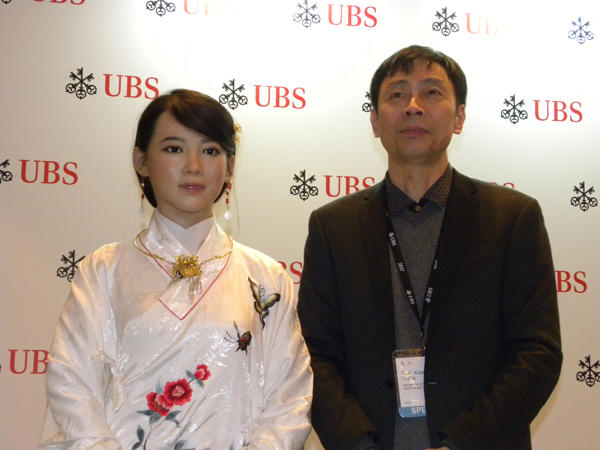China Hosts Conference to Promote AI Ethical Standards

Chen Xiaoping (right) presents a robot named Jiajia at a seminar in Shanghai in 2017. [Photo provided to China Daily]
BEIJING-China is keen on ensuring that ethical standards take hold in the booming artificial intelligence industry, says Chen Xiaoping, director of the Robotics Lab at the University of Science and Technology of China.
As AI is increasingly seen as a significant source of productivity and opportunities, the discomfort or even pessimism regarding the technology cannot be ignored, according to the leading AI scientist.
Last year, Chen was asked to set up the Professional Committee for AI Ethics under the Chinese Association for Artificial Intelligence, China's state-level AI association, and to draw up AI ethics guidelines.
According to Chen, the industry's capacity to put in place ethical guidelines lags far behind its rapid technological development.
So, how do you balance the improved production efficiency brought about by automation with the social costs of the unemployed who lose their jobs?
The stronger AI's abilities, the greater the responsibility those using the technology shoulder. So, what should they ask themselves?
And how do you apply AI technology to help solve major social issues such as upgrading industry, an aging population, uneven distribution of resources and unbalanced economic development?
To deal with these issues, Chen has proposed a new task: to develop an entire system of AI ethics, with ethical guidelines and a set of operating mechanisms to realize them.
At the Global AI Technology Conference in Nanjing of East China's Jiangsu province in May, Li Deyi, CAAI director and academician from the Chinese Academy of Engineering, said he had great expectations of the AI ethics committee and was expecting contribution from overseas experts as well.
Osamu Sakura of Japan's University of Tokyo and Center for Advanced Intelligence Project said attitudes to autonomous technologies, including AI and humanoid robots, differ between the East and the West. And comparative research should be conducted in East Asia.
Wendell Wallach, a leading AI ethics expert from the United States, said self-driving cars provide a good metaphor. Technology is moving into the driver's seat as a primary determinant of human destiny, and people need to think more about the trade-offs entailed in AI technologies.
Wallach, from Yale University's Interdisciplinary Center for Bioethics where he chairs technology and ethics studies, said the International Congress for the Governance of AI is to be held in April 2020 and he looks forward to the participation and engagement of Chinese researchers.
Chen shared his opinion on drafting ethics rules, suggesting that the guidelines should play a role on three levels.
The upper level is the basic mission of AI, which will remain unchanged for a long time.
The middle level is ethical rules, guided by the mission. When ethical rules are applied to specific AI applications, these are the basic level, the compulsory codes of practice, including technical norms, product standards, and industry regulation.
Chen said the mission of AI ethics should be about maximizing benefits, rather than just putting restraints on what can be deployed. It's about directing the technology to improve the condition of humanity and reducing risks and undesirable consequences, and especially solving major social issues.
The CAAI's plan to draft ethics guidelines drew attention from foreign and domestic counterparts. And, Chen said that AI research leaders in tech companies or associations including the China Robot Industry Alliance and Berggruen Research Center of Peking University have expressed support for his plan.
Jeroen Van den Hoven, a professor of ethics at Delft University of Technology in the Netherlands, said he and Wallach agreed that the US and Europe should have more communication and cooperation with China in AI ethics research. And given the important role of AI in the lives of people, international collaboration is going to be essential, he said.
